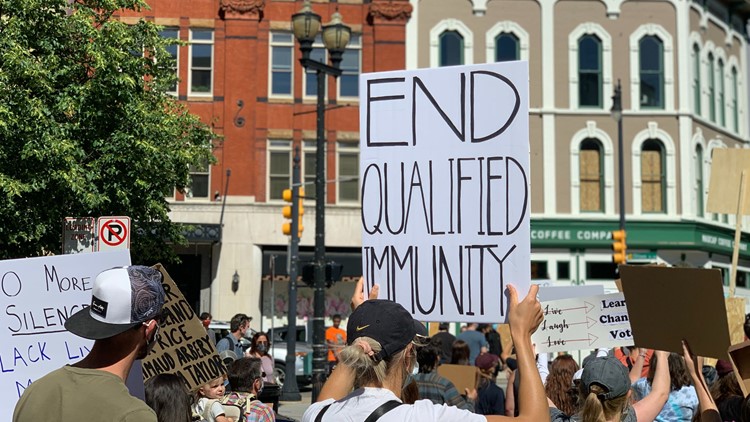In the wake of George Floyd’s death, local, state and federal governments are proposing ways to reform police departments. These measures are wide-ranging, from city police departments banning chokeholds to Congressional Democrats introducing the Justice in Policing Act.
Included in all of these motions is legislation that would end qualified immunity—a highly technical legal doctrine that helps protect law enforcement officers from liability. U.S. Rep. Justin Amash (L-Cascade Township) is one lawmaker leading the charge on eliminating this 1967 law.
What is qualified immunity?
As a part of the Civil Rights Act of 1871, individuals were granted the right to sue police and government officials that violate their rights. But that shifted 53 years ago when the U.S. Supreme Court established qualified immunity, a ruling that intended to protect government officials— law enforcement officers included—from lawsuits and financial liability.
The idea was that officers acting in “good faith and with probable cause in making an arrest” should not be worried about future litigation while doing their job.
After the Supreme Court laid the precedent for qualified immunity in 1967, its scope broadened over the years. A 1982 case says officials are immune from civil litigation, as long as their actions did not “violate clearly established statutory or constitutional rights of which a reasonable person would have known.”
The “clearly established” part is where things get tricky. It means that claims can only move forward if there is an earlier case with similar facts, which lays the groundwork for a constitutional violation.
UCLA law professor Joanna Schwartz told ABC News that "in order for a plaintiff to defeat qualified immunity, they have to find a prior case that has held unconstitutional an incident with virtually identical facts to the one the plaintiff is bringing.”
What do the critics say?
In recent years, as police brutality cases have been repeatedly pushed to the forefront because of the availability of cell phone footage and body cams, qualified immunity has been the backbone defense for law enforcement.
Supreme Court Justice Sonia Sotomayor is a critic of the doctrine, saying it tends to favor police over the public. In 2018, she wrote “It tells officers that they can shoot first and think later, and it tells the public that palpably unreasonable conduct will go unpunished.”
This week a judge on the U.S. Court of Appeals for the 4th Circuit wrote an op-ed in the Washington Post saying the court should consider eliminating qualified immunity. James A. Wynn Jr. said the doctrine creates a cycle in which people "cannot sue officers who harm them because the harmful conduct has never been 'clearly established' as a constitutional violation in a factually similar case."
Why is there a push to end qualified immunity?
Amash introduced the End Qualified Immunity Act in the week after Floyd’s May 25 death.
“This rule has sharply narrowed the situations in which police can be held liable—even for truly heinous rights violations—and it creates a disincentive to bringing cases in the first place,” the Libertarian congressman said.
Since introducing the act, it has gained rare tripartisan support in the House. More than 50 Democratic members of Congress have signed on as cosponsors, and one Republican congressman from California is also backing it.
Amash contends the pattern of police misconduct has been facilitated by qualified immunity, saying police are "insulated from consequences." U.S. Rep. Ayanna Pressley (D-Mass.) is co-leading the legislation.
Ending qualified immunity gained more traction this week when more than 1,400 professional athletes signed a letter endorsing the legislation. It has also become a specific point of reform that some protesters are advocating for as demonstrations continue across thousands of American cities.
Even with this broad support, there is hesitancy from some Republicans to back the legislation, including the president. White House Press Secretary Kayleigh McEnany called ending qualified a immunity a “non-starter.” And on Sunday morning, Sen. Tim Scott (R-S.C.) told CBS News that including limitations on qualified immunity in larger police reform legislation will be a “poison pill” in getting other measures passed.
More stories on 13 ON YOUR SIDE:
►Make it easy to keep up to date with more stories like this. Download the 13 ON YOUR SIDE app now.
Have a news tip? Email news@13onyourside.com, visit our Facebook page or Twitter. Subscribe to our YouTube channel.



